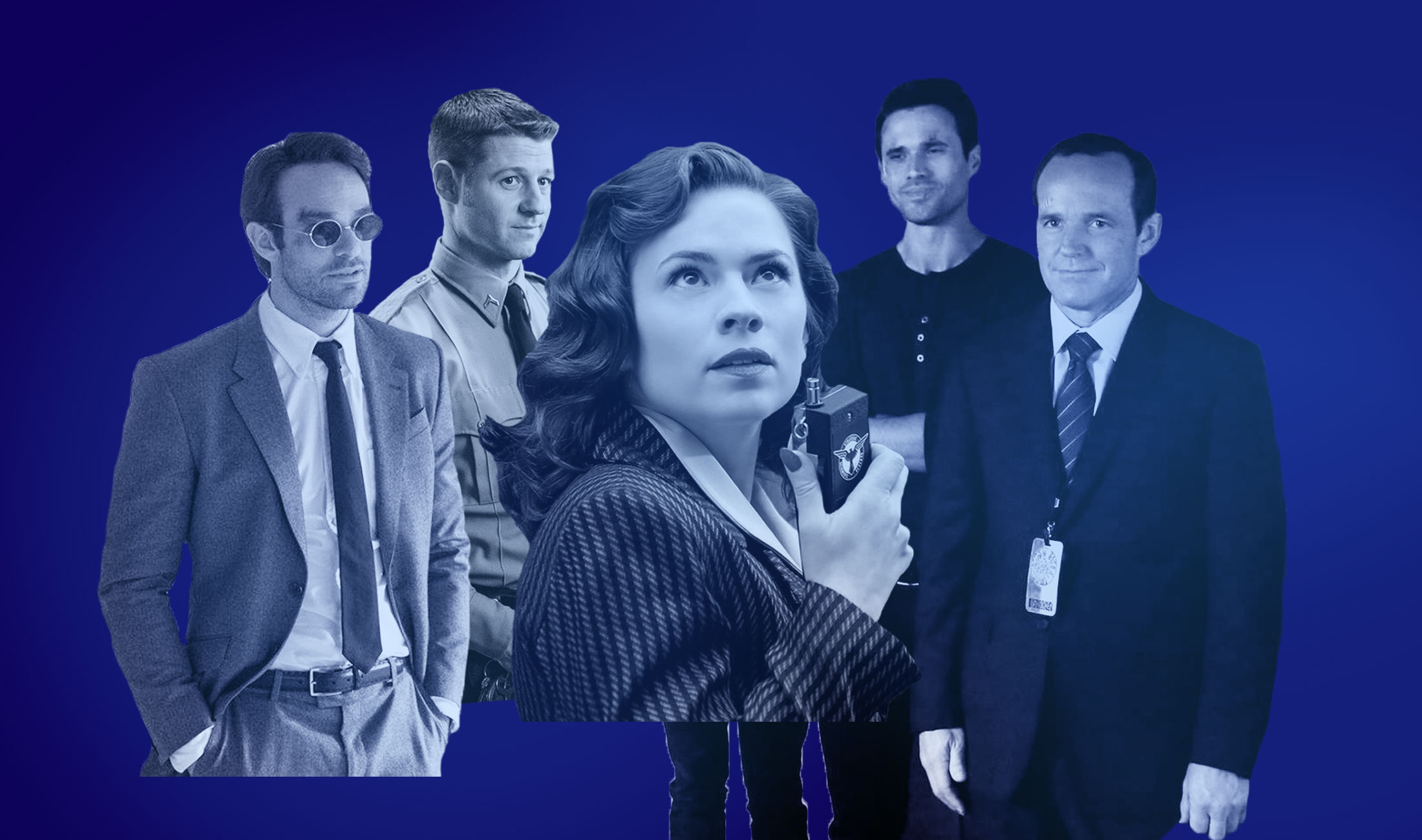Where's the love? Why superhero TV shows are so reluctant to include romance.
As the superhero genre gravitates to the small screen, romance tends to end up on the chopping block


A free daily email with the biggest news stories of the day – and the best features from TheWeek.com
You are now subscribed
Your newsletter sign-up was successful
It's been nearly 15 years since superheroes first conquered the big screen — and the small screen is next. Today, almost every major network has a comic book superhero, from Netflix's critically acclaimed Daredevil to Fox's shaky Gotham.
Like their movie counterparts, the broad outline of each of these shows is the same: do-gooders trying to save humankind from megalomaniacal villains. Since that's what the entire genre is based on, that's pretty much expected. But there's another, much stranger quality that these shows share, one at odds with the rest of television's current trends: They have eschewed romance to the point of near non-existence.
To be clear: Romance hasn't been eliminated altogether. However diluted, the classic love interests — culled from decades of comic book stories — are still around. Daredevil has its Night Nurse, and Gotham has its Barbara Gordon. Relationships are teased, and longing glances are exchanged. Occasionally there's even a hook-up. But from show to show, in episode after episode, these connections between characters have been unceremoniously thrust so far into the background that they barely touch the main story arcs. It's a baffling choice, undercutting dramatic tension and diminishing fan engagement.
The Week
Escape your echo chamber. Get the facts behind the news, plus analysis from multiple perspectives.

Sign up for The Week's Free Newsletters
From our morning news briefing to a weekly Good News Newsletter, get the best of The Week delivered directly to your inbox.
From our morning news briefing to a weekly Good News Newsletter, get the best of The Week delivered directly to your inbox.
Let's start with the worst offender: ABC. Despite Agents of S.H.I.E.L.D.'s creative resurgence in season two, the show's relationships are still largely one-directional, lacking the steamy flair that drove Whedon family shows like Buffy the Vampire Slayer and Firefly. As the second season ended, the only existing romance was between ex-spouses Lance Hunter and Bobbi Morse, who — while perfectly fine on their own — have not been particularly engaging as a pair. Watching two characters we barely know bicker and reunite is hardly the stuff fandoms are built on. And it's not like the appetite isn't there; fans have been reduced to rooting for non-existent couples (see: SkyeWard) in the absence of an actual compelling love story.
Then there's the S.H.I.E.LD. spin-off prequel Agent Carter, whose star Hayley Atwell is so charming and charismatic she could have chemistry with an empty chair. But despite the obvious potential, the series settles for the specter of her relationship with Captain America — a plot that we've already seen played out across the two Captain America movies separated by more than a half-century of story. Are we really supposed to believe Peggy Carter had no romances during the 70 years when Captain America was frozen — when she believed he was dead?
Turn the dial to Fox's Gotham, which spends plenty of time on villain back-stories and convoluted chase scenes, but only lip service to the many couples you'd find in the Batman comics on which it's based. Gotham's ostensible lead is James Gordon, and while he has several dalliances, they're almost always underdeveloped and secondary to the motivations that actually drive him.
Netflix's otherwise outstanding first season of Daredevil suffers from the same problem. Matt Murdock has a short-lived (but steamy!) affair with Claire Temple, whose purpose on the show is literally to kiss him, patch him up, and send him on his way. The villainous Wilson Fisk's relationship with Vanessa proved that Daredevil could do compelling romance, so why is this encounter merely a footnote in Daredevil's arc? Is it really more “mature” for him to focus on childhood trauma, instead of a romance that could affect his adult life?
A free daily email with the biggest news stories of the day – and the best features from TheWeek.com
The welcome exception to this platonic epidemic is The CW. Arrow and The Flash have no shortage of romances that form the backbone of both episodes and story arcs — and the shows have repeatedly reaped the benefits in both viewership and critical acclaim. The main storyline of Arrow's third season followed Oliver Queen as he struggled with his double identity. It's a compelling story in its own right — but the internal crisis mattered so much more because it affected whether he could be with Felicity Smoak. Without that relationship, the decision would affect just one character, halving its impact.
What makes The CW different than its superheroic rivals? It is actively targeting young adults between the ages of 18 and 34. In an interview with The Hollywood Reporter, network president Mark Peodwitz discussed how they planned to expand their audience reach: "We'll continue to service women 18-to-34, but the goal is to broaden it to an 18-to-34 adult audience." Superhero shows like Arrow and The Flash are their efforts to court more men — and the shows prove that including romance in their DNA retains female viewers without alienating male viewers in the slightest.
TV shows can, of course, be terrific without a central romance. But given the clear opportunities in the source material, the lack of superhero romance is strange — especially when moments arise that show clear missed opportunities for the kind of increased emotional investment that comes when you build well-developed couples. Romance also adds weight and urgency to the bread and butter of comic book shows: characters in mortal peril. These stories are built entirely around fighting and battles, and the stakes increase tenfold when there are personal repercussions for losing someone. When Tripp died in Agents of S.H.I.E.L.D.'s midseason finale, the characters quickly moved on. How much more impact would have been felt if he and Simmons had been in love, as the series occasionally teased and ultimately ignored?
This reluctance to include romance seems to be based on misguided fears about alienating certain segments of the audience. In an interview with HitFix, Agents of S.H.I.E.L.D. producer Jed Whedon spoke openly about the wide age range he wanted his show to reach. "The fourth-grader and his mom will both enjoy the show for different reasons, but they'll laugh at the same jokes,” he said. “And while she might be there for the emotional character stuff and he might be there for the gadgets, we're hoping they're both there."
There's also the antiquated but enduring notion that superheroes — and comics in general — are made solely for boys, who are turned off by anything resembling a love story. Unfortunately, this stereotype remains pervasive; in an email leaked by the Sony hack, Marvel CEO Ike Perlmutter clearly expresses his belief that female-lead superhero movies cannot be profitable. "[Supergirl] came out in 1984 and did $14 million total domestic with opening weekend of $5.5 million. Again, another disaster." Even now, superheroes are drawn using thick gender lines, and romance runs the risk of only appealing to women — a risk executives clearly do not want to take.
Of course, anyone who's paying attention knows how ludicrous these concerns really are. With any luck, TV executives will get a clue, and stop treating a real, adult romance as the one challenge a superhero won't tackle.
Alice Walker writes about arts, entertainment and culture. She contributes regularly for Over The Moon, Elite Daily, and Bustle, where she is a weekly television columnist.
-
 Political cartoons for February 3
Political cartoons for February 3Cartoons Tuesday’s political cartoons include empty seats, the worst of the worst of bunnies, and more
-
 Trump’s Kennedy Center closure plan draws ire
Trump’s Kennedy Center closure plan draws ireSpeed Read Trump said he will close the center for two years for ‘renovations’
-
 Trump's ‘weaponization czar’ demoted at DOJ
Trump's ‘weaponization czar’ demoted at DOJSpeed Read Ed Martin lost his title as assistant attorney general
